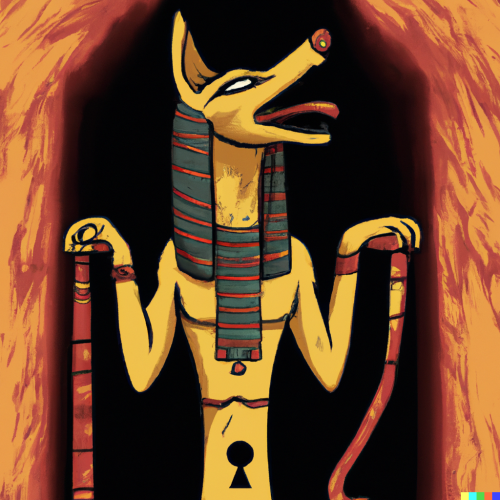Anubis was the ancient Egyptian god of the dead and embalming. He played a crucial role in the mummification process and guiding souls to the afterlife. As the divine embalmer, he oversaw the mummification rituals.
He was believed to have invented the embalming process after using it on Osiris‘ body. Anubis guided souls to the afterlife and participated in the weighing of the heart ceremony to judge the deceased’s worthiness. In this ritual, the heart was weighed against Ma’at’s feather of truth on a scale. If the heart was lighter than the feather, indicating the person led a virtuous life, Anubis would allow them to enter the afterlife.
However, if the heart outweighed the feather, the soul would be devoured by the monster Ammit and cease to exist. Anubis was also the protector of graves and tombs, punishing anyone who violated burial customs. He was depicted as a man with a jackal head, as jackals were seen scavenging around cemeteries. The black color of jackals was associated with the fertile black soil, symbolizing rebirth. Priests would wear jackall masks while performing mummification rites.
Anubis’ significance in Egyptian Religion
Anubis was one of the oldest and most important deities in ancient Egyptian religion, venerated since the first royal tombs of the First Dynasty. He maintained the cycles of life, death, and the afterlife, representing the cosmic order (Ma’at). His cult center was in Cynopolis, but he was universally revered across Egypt.

Appearances in modern culture
Books
- Anubis Speaks!: A Guide to the Afterlife by the Egyptian God of the Dead <– yes, for kids
- Anubis: The History and Legacy of the Ancient Egyptian God of the Afterlife
- Children of Anubis (Supernatural Novel #17) by Tim Waggoner <– a Sam & Dean classic
- The Complete Gods and Goddesses of Ancient Egypt
- The Egyptian Book of the Dead: The Complete Papyrus of Ani : The Complete Papyrus of Ani
Movies and series
Video games
- Age of Mythology (2002)
- Assassin’s creed: Origins (2017)
- SMITE (2015)
- SMITE 2 (2024)
